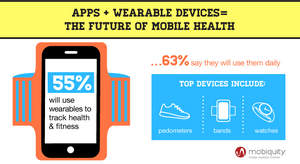BOSTON, MA--(Marketwired - May 8, 2014) - A new study of 1,000 users of mobile health and fitness apps has found that 55 percent plan to also use wearable devices to track and improve their health. The "Get Mobile, Get Healthy: The Appification of Health & Fitness" study, commissioned by mobile engagement provider Mobiquity, Inc., reveals the impact of mobile apps and wearable devices on consumers' personal health. An infographic illustrating the findings is at: http://www.mobiquityinc.com/mHealth-infographic-2014.
Of the 55 percent who plan to introduce wearables into their health and fitness regime, more than half say they'll use pedometers, with 48 percent interested in wristbands and 45 percent favoring smartwatches. Sixty-three percent anticipate using their wearable device on a daily basis. Today's iPhone and Android smartphone users are more likely to become wearables users in the future compared to those using BlackBerry and Windows phones, the research also found. Sixty-five percent of men plan to use wearables on a daily basis compared to 60 percent of women.
How mobile technology makes us healthier
- 73 percent of respondents believe they are healthier today, thanks to their use of mobile technology to track health and fitness. Currently, 70 percent are using mobile apps daily to monitor calorie intake and physical activities.
- 69 percent believe using mobile technology to track their health and fitness is actually more important than using their smartphone for social networking or mobile shopping.
- In the next five years, 63 percent will continue -- and even increase -- their use of mobile technology for health tracking.
- The largest group of people currently using smartphones to track health and fitness -- and planning to add wearables -- is aged between 21-39 years.
"Triggered by our innate curiosity and fueled by mobile technologies, the quantified self movement has taken off as people collect data about everything from the calories they ingest and distances they run, to their sleep cycles and medication adherence," explains Scott Snyder, president and chief strategy officer at Mobiquity. "Mobile apps were the first chapter and wearables devices are emerging as the next great frontier of personal healthcare. That said, for wearable technologies to become mainstream, they must overcome three key hurdles: they must mesh with our daily routines, become aesthetically cool and offer privacy controls."
Mobiquity commissioned independent research firm Research Now to survey 1,000 consumers who use, or plan to use, health and fitness mobile apps. The study was conducted between March 5-11, 2014.
Mobiquity's study "Get Mobile, Get Healthy: the Appification of Health & Fitness" can be downloaded here: http://www.mobiquityinc.com/mHealth-report-2014.
An infographic illustrating the research findings can be found here: http://www.mobiquityinc.com/mHealth-infographic-2014.
About Mobiquity
Mobiquity is a mobile engagement provider creating innovative solutions that drive business value. Because mobile is in our DNA, clients benefit from how we expertly and effectively blend the three key disciplines that unleash the power and innovation of mobile computing: strategy, user-centered design and core technology. Since inception in 2011, we have worked with more than 150 companies, including CVS, Fidelity Investments, MetLife, the New York Post, Pfizer, Medavie Blue Cross, Putnam Investments, The Boston Globe, The Weather Channel and Weight Watchers International. To learn more, visit www.mobiquityinc.com.
